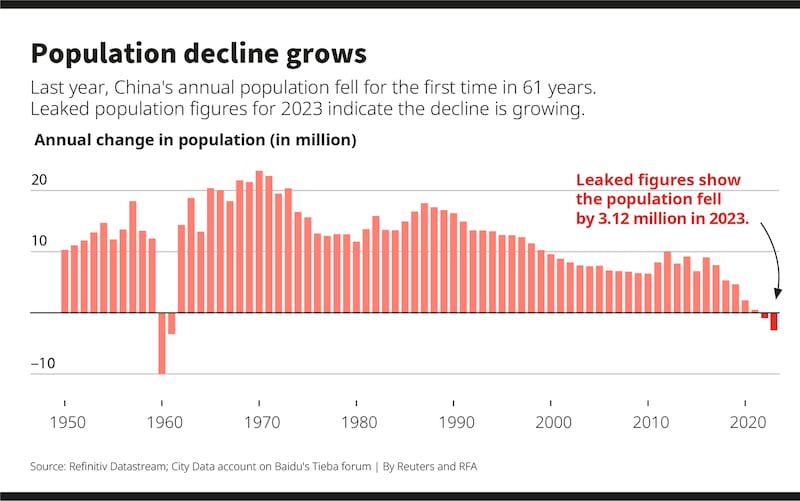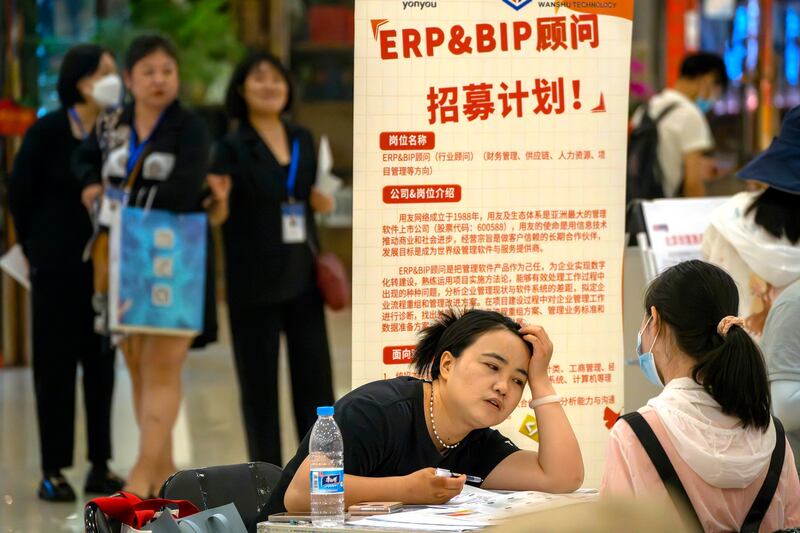Chinese censors deleted an article on Wednesday that reportedly leaked full-year population figures for 2023, revealing a plummeting birth rate despite ongoing efforts by the ruling party to encourage people to have families.
While official figures won’t be confirmed until Jan. 17, the Mother and Infant Daily news service said 7.88 million babies were born across China 2023, 1.68 million fewer than in 2022.
Given that 11 million people died this year, China’s population has therefore fallen by 3.12 million, the population of a medium-sized Chinese city, the report said, citing the City Data account on Baidu’s Tieba forum site.
The City Data post had been deleted by Wednesday evening local time, suggesting that the topic is a highly sensitive one for the ruling Chinese Communist Party, which is keen to sing the praises of the economy in a bid to boost people’s confidence in the future.
However, the reported figures were in line with earlier estimates, including one by Peking University School of Medicine scholar Qiao Jie, who told a forum in August that the number of newborns has plummeted by 40% over the past five years.
“The number of births in 2023 is expected to range from 7-8 million,” Qiao was quoted as saying by the China Business News.
The journal China Philanthropist predicted in May that new births this year would come in under the 8 million mark, extrapolating figures that were available at the time.

In 2022, China’s National Bureau of Statistics reported a drop in population of around 850,000 to 1.41175 billion, the first fall since 1961, the last year of China’s Great Famine.
Authorities also announced a nationwide poll of 1.4 million people in October, as the Communist Party struggles to encourage more people to marry and have kids, Reuters reported.
Step up, women!
Faced with plummeting marriage rates, flagging births and a rapidly aging population, President Xi Jinping wants the country’s women to step up and embody “the traditional virtues” of marriage and raising children in a bid to “rejuvenate” the nation.
Authorities in Hangzhou, Zhengzhou and other major cities with populations in the tens of millions, are promising cash subsidies for new families, with the Wuhan Donghu High-tech Zone offering 60,000 yuan (US$8,400) per child, the highest known rate so far, according to recent media reports.
Meanwhile, the number of Chinese couples tying the knot for the first time has fallen by nearly 56% over the past nine years, the financial magazine Yicai quoted the 2023 China Statistical Yearbook as saying, with such marriages numbering less than 11 million in 2022.
Young people are increasingly avoiding marriage, having children and buying a home amid a tanking economy and rampant youth unemployment, part of an emerging social phenomenon known as the " young refuseniks" – people who reject the traditional four-fold path to adulthood: finding a mate, marriage, mortgages and raising a family.
A recent poll on the social media platform Weibo found that while most of the 44,000 respondents said 25-28 is the best age to marry, nearly 60% said they were delaying marriage due to work pressures, education or the need to buy property.
COVID effect
A Chinese expert who declined to be named for fear of reprisals told Radio Free Asia that the leaked figures likely signal a turning point in the aging of the population, and blamed the three years of stringent zero-COVID policies under Xi.
“The official statistics for negative population growth in 2023 are the direct result of three years of pandemic restrictions and the zero-COVID policy, which dampened people’s desire to have children,” the expert said.
“Now, the aging of society is truly accelerating, and birth rates can’t keep up with [that].”
The researcher said people have no energy left after three years of zero-COVID policies.
“Low fertility ... is also a political choice,” they said. “Young people in China over the past year have generally chosen not to marry, and have little desire to reproduce.”

“They’re not buying homes, making step-by-step career moves or growing the population as their parents or the government would like,” the expert said. “The model of accumulating wealth and then having kids is broken.”
“Young people are starting to make their own choices.”
A Beijing resident who gave only the surname Guo for fear of reprisals said many young people simply don’t have enough of an income to set up independently.
“The main reason is that young people are scared to have kids ... because they can’t guarantee being able to feed them food that is safe, especially infant formula,” Guo said. “A lot of people have said this to me -- I think it’s quite sad.”
A resident of the southwestern province of Sichuan agreed.
“The main reason is that young people today are under a lot of pressure,” said the woman, who gave only the surname Jiang for fear of reprisals. “Raising kids now isn’t as easy as it used to be.”
Translated by Luisetta Mudie. Edited by Malcolm Foster.
